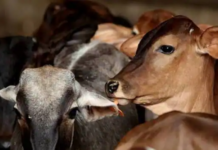New Delhi, July 11, 2020: The shutting down of schools due to Covid-19 is affecting not only children, now unable to access cooked nutritional food under the Mid Day Meal (MDM) scheme, but also farmers for whom it provided an assured market.
An example is the Karnataka government’s Ksheera Bhagya scheme, which offers free milk over and above the MDM food entitlement. Under it, around 64 lakh children studying in 55,683 government schools from Class I to X, and another 39.5 lakh aged six months to six years in 64,000 anganwadi centres, across Karnataka are given 150 ml and 125 ml of milk, respectively daily for five days of the week.
“It is a significant market. The supplies to schools have totally stopped, while we are continuing to deliver to the CDPOs (child development project officers) in different talukas (sub-districts). They deal with the village/ward level anganwadi workers, who are to go to the doorstep of beneficiaries even while their centres are shut” said an official of the Karnataka Cooperative Milk Producers’ Federation (KMF) that markets dairy products under the ‘Nandini’ brand.
Under Ksheera Bhagya, which had a budget of Rs 1,043 crore in 2019-20, KMF makes whole milk powder (WMP) available to schools and anganwadi centres. A school child’s 150-ml daily milk quota is made by adding hot water to 18 gm of WMP, while it is 15 gm in the case of the 125 ml for anganwadi beneficiaries according to the reports published in indianexpress.com.
In the pre-Covid period, government schools in Karnataka were consuming 47 tonnes of WMP daily on an average, equivalent to nearly 4 lakh kg per day (LKPD) of cow milk containing 3.5% fat and 8.5% solids-not-fat. Along with the 35 tonnes (3 LKPD) by anganwadis, the total offtake of 7 LKPD accounted for almost a tenth of the KMF dairy unions’ average procurement of 75.61 LKPD in 2019-20.
“We have clearly lost a market of 4 LKPD, even as our procurement itself has increased by 4 LKPD. Last year, our peak procurement was in June, when it touched 84.44 LKPD. This year, we have crossed 88 LKPD in the current month. With normal sales also falling (due to the collapse of out-of-home consumption), our milk powder stocks have already reached 18,000 tonnes and will further accumulate in the coming months (with improved fodder availability from the monsoon rains),” the official admitted.
KMF unions are said to have slashed procurement prices for cow milk from Rs 29-30 to Rs 24-25 per litre since the March 25 lockdown. Also, farmers have reportedly not received the Rs 6/litre incentive – paid by the Karnataka government in addition to the procurement price, for which a separate sum of Rs 1,459 crore was budgeted in 2019-20 and Rs 1,250 crore this fiscal – for the last three months.
Besides Karnataka, Gujarat is the other state where milk is included as part of MDM and ICDS (Integrated Child Development Services) programmes in schools and anganwadis. But is Dudh Sanjivani Yojana, which serves 200-ml of fortified flavoured milk five days a week, is limited to about 30 lakh beneficiaries with a budget provision of Rs 342 crore for 2020-21.
Dairy farmers aren’t the only ones losing out from schools shutting down. Tamil Nadu and Andhra Pradesh offer five eggs a week as supplementary nutrition under MDM, adding up to 160 for every schoolchild over 32 working weeks. Other states providing eggs in MDM include Telangana (thrice a week or 96 per child per year); Odisha, Chhattisgarh, Jharkhand, West Bengal and Tripura (twice or 64 annually); and Kerala, Bihar, Assam, Uttarakhand and Jammu & Kashmir (once or 32). They also supply to anganwadis technically operating for 300 days a year: Telangana (7 eggs per week); Odisha (five), AP (four); TN, Jharkhand and West Bengal (three); Karnataka (two); and Bihar and Tripura (one).
That, again, makes for a not-small market. “AP and TN alone lift 55 lakh eggs daily, with Telangana doing another 30 lakh. All states put together procure and distribute up to 2 crore eggs under MDM and ICDS, which is 7-8% of the country’s 25 crore per day production,” estimated Sanjeev Chintawar, Business Manager of the Hyderabad-based National Egg Coordination Committee.
According to him, the closure of schools has led to 70% of the 2 crore eggs per day MDM-ICDS market being lost. Poultry farmers, too, have cut down daily production to roughly 20 crore eggs.
“Recouping losses is more difficult for layer (egg) than broiler (chicken meat) farmers. A broiler bird is market-ready in 35-40 days from the chick-rearing stage, whereas a layer takes 18-20 weeks just to start producing and will give 400 eggs till its life cycle of 80 weeks. MDM-ICDS has a potential for consuming 6-7 crore eggs daily, which can help stabilise the market for farmers and also deliver nutrition to poor children,” added Chintawar.




























